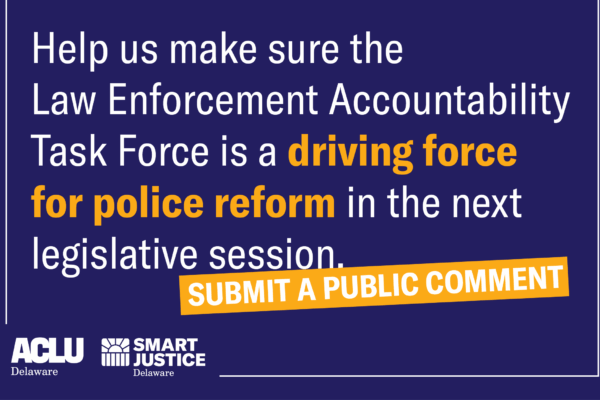If you’d like to get involved in making real, meaningful police reform happen in Delaware please consider making a public comment at the next Law Enforcement Accountability Task Force (LEATF) virtual meeting on December 2, 2020 at 6PM. Take the following steps to make sure your voice is heard:
- Register for the LEATF meeting here.
- Learn how to advocate for these issues so you can create the kind of change you want to see in your state by using the LEATF Action Guide below.
- Make an in-person public comment at the LEATF meeting on December 2, 2020 at 6 PM. You can also make a public comment by emailing the LEATF at [email protected].
For more information, email us at [email protected]. We hope to “see” you there!
What is the Law Enforcement Accountability Task Force (LEATF)?
The LEATF was established to study, make findings and recommendations to state leaders, the Governor, and police agencies regarding police use of force, workforce development, community policing, and transparency and accountability.
Call to Action
Register and attend the LEATF virtual meeting on December 2, 2020 at 6:00 PM and ask them through public comment to prioritize policies that foster fairness, transparency, and accountability. You can also submit public comments to [email protected].
Messaging
- Law enforcement needs to recognize and publicly acknowledge their role in past, present, and any future injustice or discrimination. This transparency and internal accountability is key to rebuilding public trust.
- Localities, like Wilmington, are already establishing citizen review boards. Now the LEATF must make meaningful recommendations to allow citizen review boards to operate in their full strength and give communities more oversight over their police departments.
- Police officers must be fair, transparent, and accountable. Otherwise, communities will not view police officers as a legitimate authority, making it less likely they will assist police agencies in solving violent crimes, which makes us all less safe.
- Without transparency, the public may remain suspicious that officers are not held accountable for their actions. Similarly, a transparent process can also help to demonstrate when officers acted appropriately.
Goals
The LEATF should prioritize policies that enhance public trust including:
- Revising the Law Enforcement Officers’ Bill of Rights (LEOBOR): LEOBOR governs how police can be investigated for misconduct and keep those records private. Many of the necessary changes to increase transparency and accountability are not possible without significant revisions to LEOBOR to make police disciplinary records and use of force reports public record.
- Collecting and Making Police Data Public: Too little information about police departments and officers is made public. Fully transparent practices and outcomes improve decision-making, allow the public to hold the legislators and police accountable, and enable the public to push for change in the future. Criminal justice agencies must commit to tracking and publishing details and statistics about police misconduct, arrests, stops, and use of force, including disparities that these activities may produce. Police departments should also make policy manuals and personnel information public.
- Revising the Standards and Practices for Use of Force: Delaware’s use of force standards allow law enforcement officers to use deadly force when they have a subjective fear for their lives or the safety of others. Unfortunately, this standard makes it nearly impossible for officers to be held accountable when they use unnecessary force. Most other states have raised the threshold for when officers may lawfully use deadly force, ensuring that it must be reasonably and responsibly used. Even more so, other states have reduced harm through de-escalation, peer support, and pre-arrest diversion. In addition, state and national leaders have sought to rescind qualified immunity, so that officers can be held accountable when they engage in unconstitutional use of force.
- Implementing Body-worn Cameras: Video footage captured during officer-community interactions can help support or dismiss accounts conveyed by police officers and community residents. Body-worn cameras can lead to faster resolution of complaints that allege excessive use of force and other police misconduct. Body-worn cameras should be implemented and require to be turned on during all police and community interactions. That footage should be subject to publication.
- Establishing Independent Review Boards: Many community members believe that police departments do a poor job of holding police officers accountable when misconduct occurs. There is a need to (1) hold police officers accountable for unjustified use of deadly force against community members, and (2) hold police officers accountable for the routine violations and grievances that go unresolved and result in resentment from community members. Civilian review boards should have subpoena, discipline and policy review authority.
- Discontinuing Safe Streets and the Governor’s Task Force: The Operation Safe Streets and the Governor's Task Force (OSS/GTF) allows police officers and probation officers to jointly police those on probation, and by extension their family and communities. This aggressive policing program has eroded trust within communities and has led to black and brown communities being overpoliced. As stated in the 21st Century Policing report, law enforcement should consider the damage of overly aggressive law enforcement strategies that can harm communities and do lasting damage to public trust.
- Discontinuing Civil Asset Forfeiture: Delaware’s forfeiture laws allow for police to seize property unless an owner can prove that the evidence is not forfeitable. Thus, the burden of proof is on the property owners to demonstrate that their property being seized has nothing to do with illegal activity. Moreover, law enforcement is incentivized to seize property because it creates revenue for the Special Law Enforcement Assistance Fund, which they are not obligated to publicly account for.


